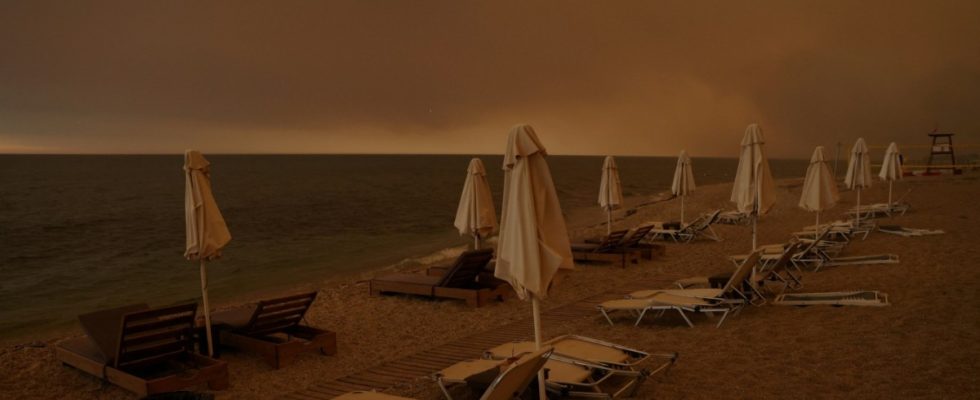Fire chief Giorgos Pournaras is visibly stunned in front of the cameras. “In 32 years of my professional career, I’ve never experienced anything like this,” he said on Wednesday in view of the numerous major fires that are causing devastation in many regions of Greece and are far from being under control.
Millions of Greeks and tourists must continue to live in a kind of limbo: hazy, smoky air hundreds of kilometers away from the fires, a sky obscured by clouds of smoke and the sun only as a small shining point on the horizon awaited them. For the fifth day in a row, the country is battling massive vegetation fires. The fire fronts in the north-east in particular are still spreading, but fire brigades and volunteers are also desperately fighting the flames near Athens.
Where people want to go on vacation and enjoy the summer time, the air quality has deteriorated massively in recent days. On many holiday islands, tourists brave the smoke, go to the beach, to the tavern or take a trip on a tour boat. However, almost everyone has a bad feeling about the hazy atmosphere and the stench of smoke and fire – just like the smell of smoke on their clothes.
The newspaper Kathimerini According to the report, up to 80 percent of Greece’s area has been covered by clouds of smoke. The problem affects almost the whole country, Nikos Michalopoulos from the National Observatory of Athens told the newspaper. According to the weather service, the smoke from the Dadia National Park in the north-east of the country traveled more than 950 kilometers to the Ionian Sea. It covered an area of around 110,000 square kilometers, which corresponds to around 80 percent of Greek territory. “It’s one of the most impressive smoke transports we’ve seen in recent years,” said Athens National Observatory director Kostas Lagouvardos.
The Greek Association of Pneumologists recommended people stay indoors as much as possible and keep windows and doors closed. Specifically, values of 106 micrograms of fine dust in the size category PM2.5 (diameter less than 2.5 micrometers) per cubic meter of air were measured on Tuesday in the city of Alexandroupolis, which was almost surrounded by fire. It is precisely such small particles that are considered harmful and cause strokes, cancer and respiratory diseases. They can sometimes penetrate into the alveoli and the bloodstream.
In the capital, Athens, the situation remained tense; among other things, it burned north-west on the mountain Parnitha. There, the fire brigade fought all night to prevent the flames from spreading to the mountains. Parnitha is the green lung of Athens and is also a national park area. There were massive aerial operations: seven firefighters and eight helicopters were on the move, including two German planes who are in Greece as part of the EU’s civil protection mechanism. In total, at least 15 major or larger fronts were burning on Wednesday, satellite images showed. Countless villages and settlements, but also retirement homes, a refugee camp and a children’s home were evacuated as a precaution.
Penalties for negligent arsonists increased dramatically
In the meantime, the discussion about arsonists is getting louder among the population. The unanimous opinion is that it cannot be that so many fires break out under perfect conditions for terrible forest fires. The search for perpetrators, however, turns out to be difficult, especially since the fires are initially mostly in impassable terrain, where arsonists can quickly escape unnoticed. After all: It was only at the beginning of August that Minister for the Protection of Citizens Kikilias announced that the penalties would be drastically tightened. The law previously provided for small penalties of 300 to a maximum of 5,000 euros, but now 30,000 euros are due in serious cases, and the amount is to be doubled in the case of repeat offenders. In addition, the person concerned could be billed for the costs of firefighting.
There is no question for experts that arson is often involved – as in the forests of Dadia, where twelve fires broke out within two hours on Monday. However, fires are often also caused by negligence, for example when people burn, grill or weld and grind garden waste despite strong winds and severe drought, so that sparks are created that ignite fires. Civil protection, which publishes the forecast of the risk of forest fires every day, warns of such actions. The authority’s map looks much better for Thursday than at the beginning of the week, because the strong summer wind called Meltemi is expected to ease off slightly. So far, he had fanned the flames enormously in many places. Nevertheless, the danger remains locally “high” to “very high”. The meteorologists are still predicting wind speeds of around 50 kilometers per hour by the end of the week.

